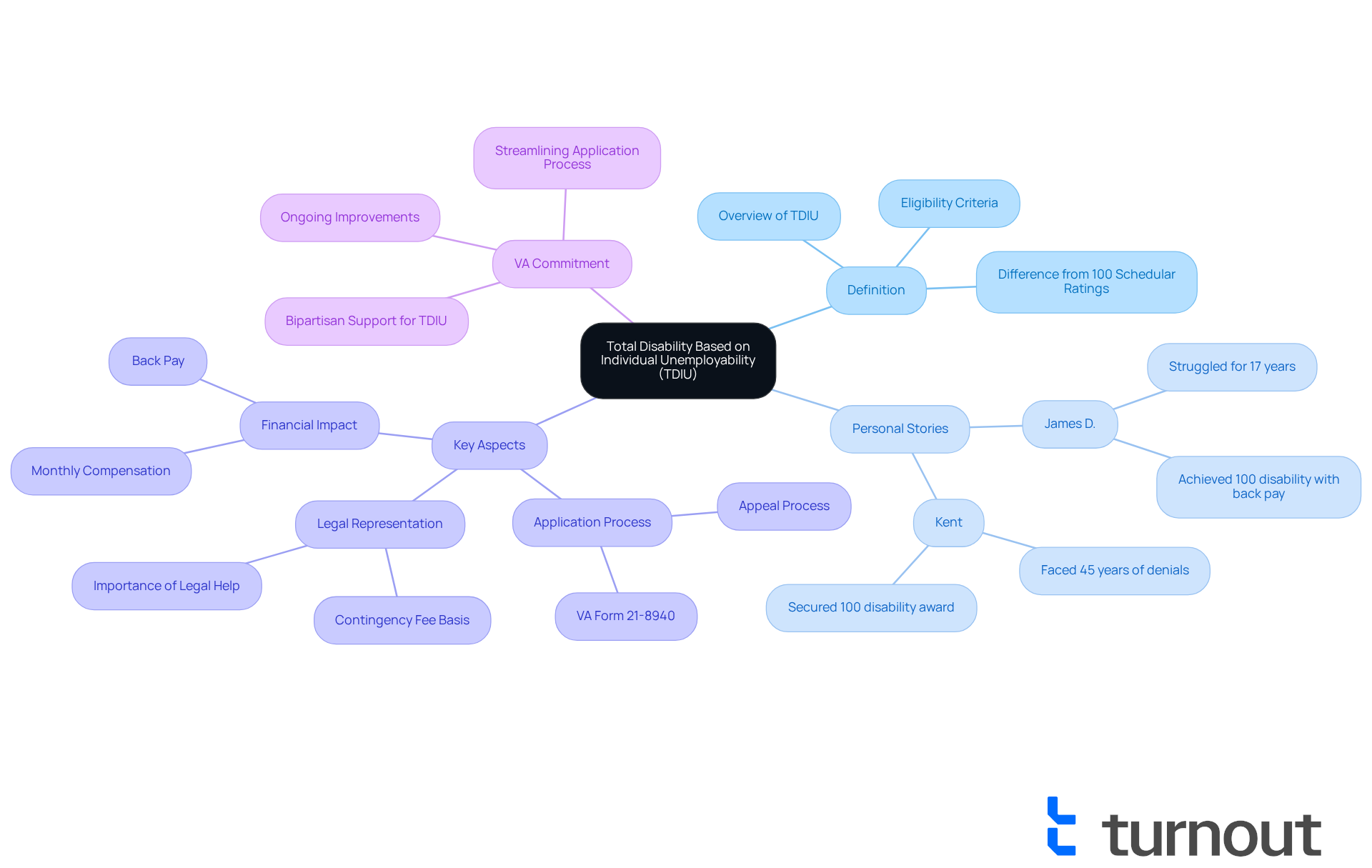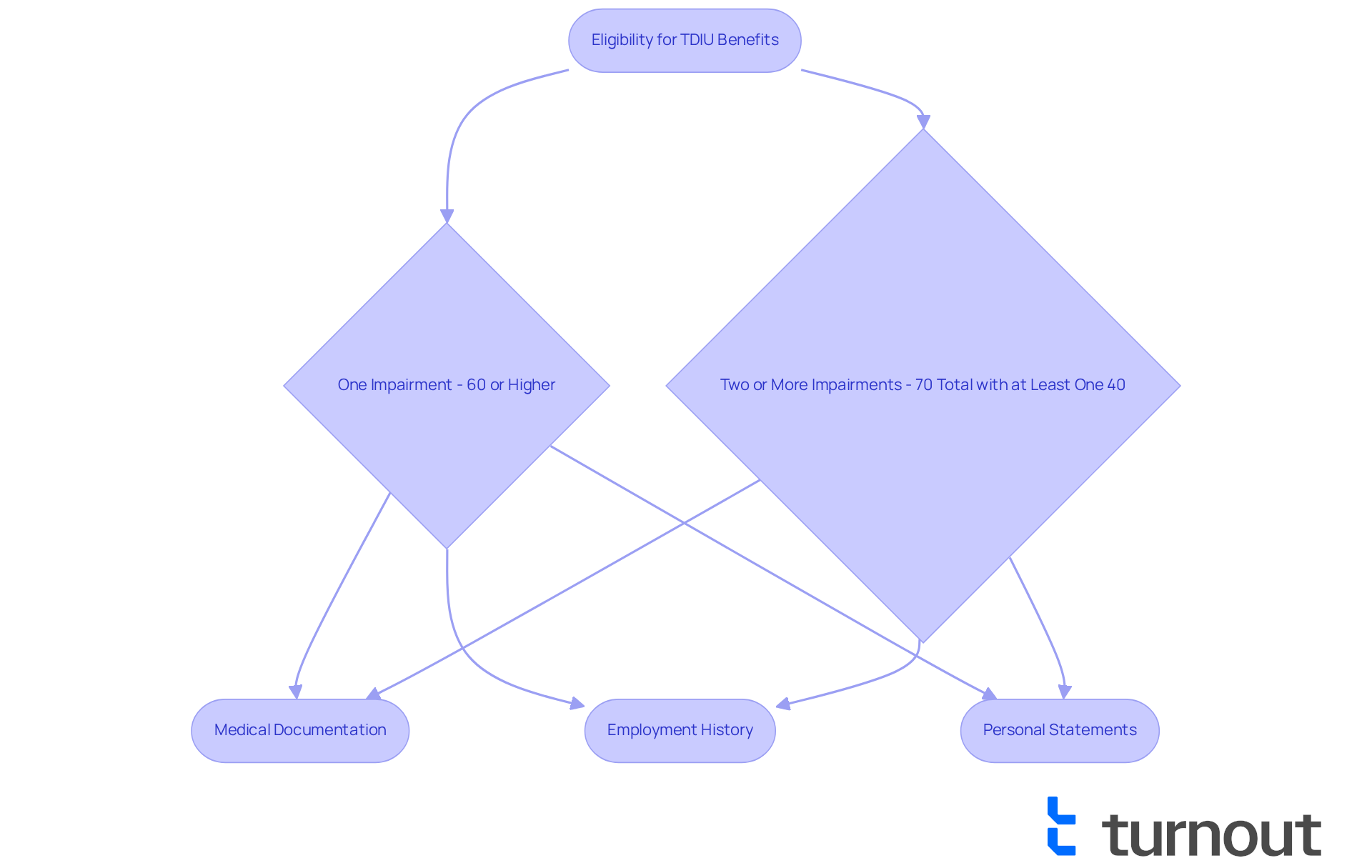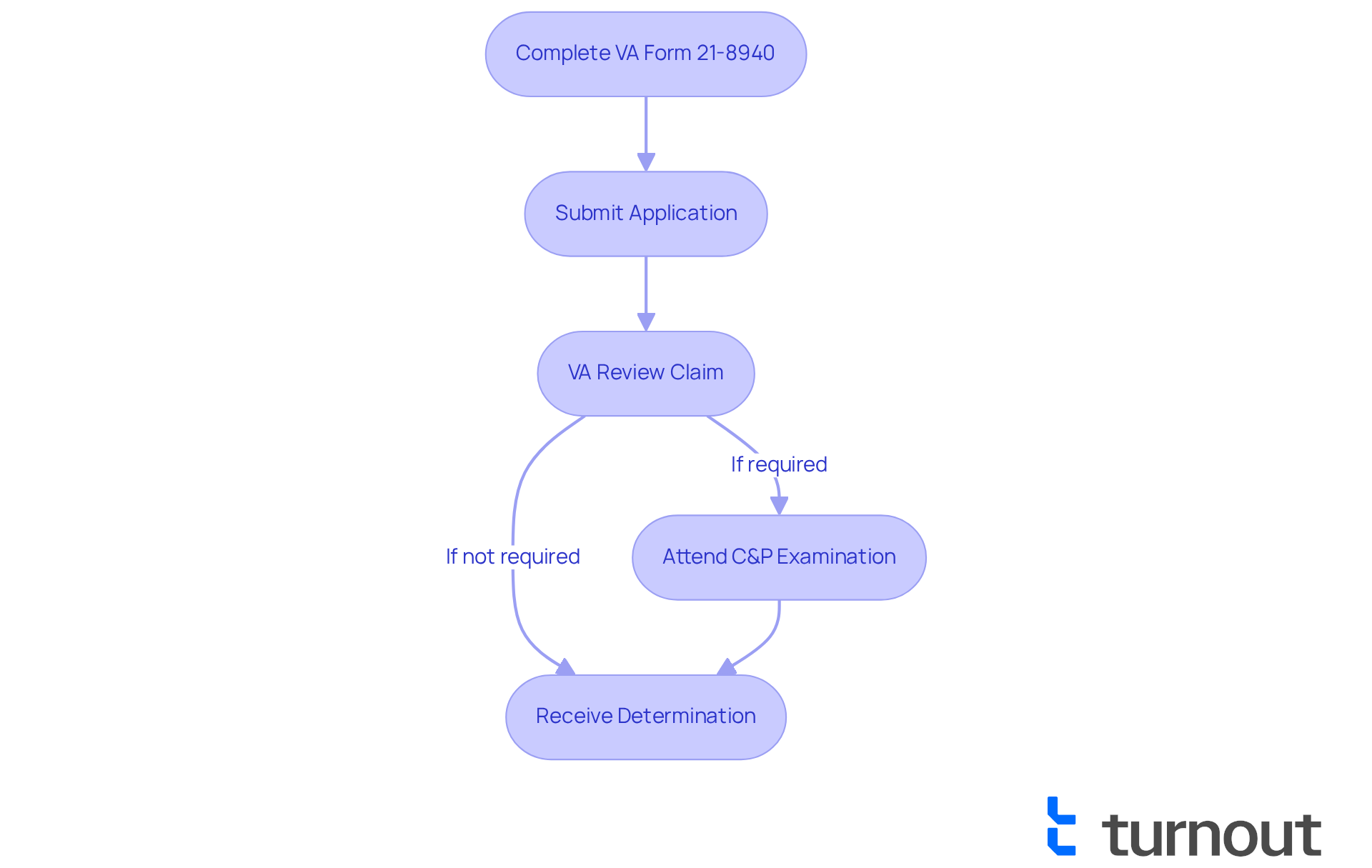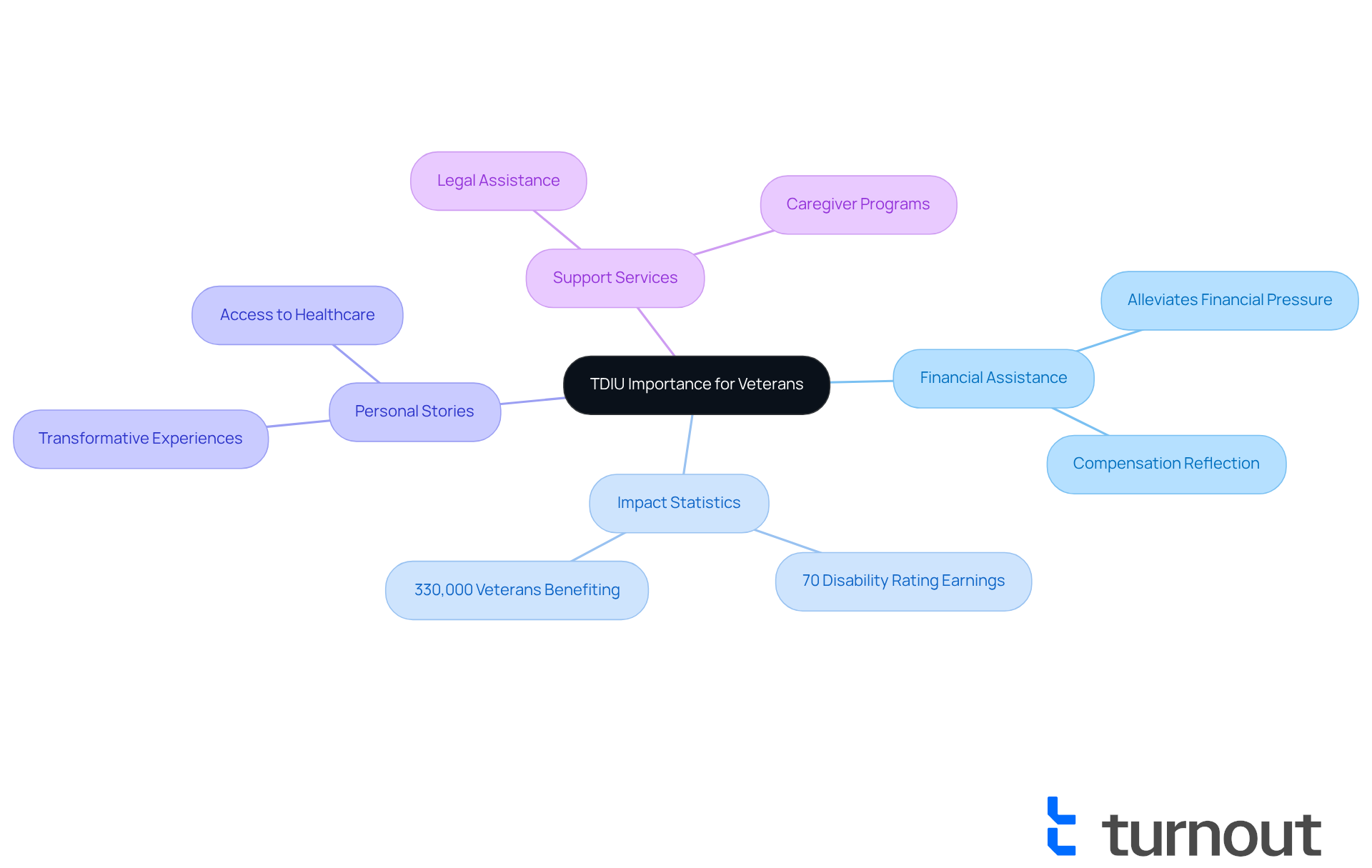Overview
Total Disability based on Individual Unemployability (TDIU) is a vital benefit for veterans. It allows them to receive compensation that equates to a 100% disability rating, even when their service-related impairments fall short of standard percentage requirements. We understand that many veterans struggle to maintain substantial employment due to their disabilities. TDIU provides essential financial support and acknowledges the sacrifices made by these brave individuals.
Personal success stories illustrate the impact of TDIU, showcasing how it has changed lives. The ongoing efforts of the VA to streamline the application process further highlight the importance of this benefit. It’s common to feel overwhelmed when navigating these systems, but know that you are not alone in this journey. We're here to help you find the support you deserve.
Introduction
Understanding the nuances of Total Disability based on Individual Unemployability (TDIU) is crucial for veterans grappling with the impact of service-related disabilities. We recognize that this journey can be overwhelming. TDIU offers a lifeline, providing financial support akin to a 100% disability rating, even when veterans' impairments fall short of that standard.
However, navigating the eligibility criteria and application process can feel daunting. It's common to wonder: what does it truly take to secure these vital benefits? This article delves into the definition, requirements, and application steps for TDIU, shedding light on how veterans can access the support they deserve.
Remember, you are not alone in this journey, and we're here to help.
Define Total Disability Baseded on Individual Unemployability (TDIU)
What is TDIU? It refers to Total Incapacity Based on Individual Unemployability, which is a vital benefit offered by the Department of Veterans Affairs. It allows veterans to receive compensation similar to a 100% impairment rating, even if their service-related conditions do not meet the standard percentage requirements for total incapacity. This program is specifically designed for those whose impairments hinder their ability to maintain significantly profitable employment. In 2025, it is anticipated that thousands of veterans will qualify for disability benefits, underscoring the ongoing challenges many face in the job market due to their service-related conditions.
Consider the story of James D., who fought for 17 years to secure a higher compensation rating. His journey exemplifies the transformative power of TDIU. Once he received support, he achieved a 100% impairment rating with back pay, significantly improving his financial stability. Similarly, Kent, who faced 45 years of rejections, ultimately received a 100% impairment award. He expressed heartfelt gratitude for the assistance that guided him through the complex VA system.
Experts emphasize that what is TDIU goes beyond being a financial safety net; it acknowledges the profound effects of service-related challenges on the lives of those who have served. As one veteran shared, this benefit has been a lifeline, allowing him to focus on recovery rather than financial burdens. The program recognizes that many former service members, even without a total impairment rating of 100%, are unable to work due to their circumstances, thereby providing essential support.
Key aspects of total and permanent compensation include:
- The ability to receive payment at the full rate, even if the overall impairment rating is reduced.
- The option to appeal if a request is denied.
The VA’s commitment to understanding what is TDIU is evident in its ongoing efforts to streamline the application process and improve communication with service members, ensuring that those in need receive the support they deserve. As the landscape of assistance for former service members continues to evolve, understanding what is TDIU remains a crucial resource for individuals facing the challenges of unemployment due to service-related issues.

Identify Eligibility Requirements for TDIU Benefits
We understand that navigating the process for Total Disability based on Individual Unemployability (TDIU) benefits can be overwhelming, especially when trying to comprehend what is TDIU. To qualify, veterans must meet specific eligibility criteria that are designed to support you in your journey. Primarily, you need to have at least one service-connected impairment rated at 60% or higher. Alternatively, you can qualify with two or more service-connected conditions that combine for a rating of 70% or higher, as long as at least one of those conditions is rated at 40% or greater.
It's important to note that former service members can obtain TDIU benefits at the full rate even if their overall impairment rating is below 100%. Moreover, you must demonstrate that your service-related impairments prevent you from obtaining or retaining significantly rewarding employment. This evidence can include:
- Medical documentation
- Employment history
- Personal statements detailing how your disabilities impact your work capabilities
Understanding what is TDIU is essential. It empowers you to evaluate your eligibility for Total Disability based on Individual Unemployability and prompts you to consider what is TDIU while encouraging you to submit applications, even if you have not yet reached the rating thresholds. The VA has established particular standards, explaining what is TDIU, which assists service members in understanding their eligibility and highlights the significance of these benefits. Remember, you're not alone in this journey; we're here to help you every step of the way.

Outline the Application Process for TDIU
Navigating the application process for Total Disability based on Individual Unemployability (TDIU) can feel overwhelming, especially for those wondering what is TDIU. We understand that this journey is not easy, and we are here to help you every step of the way. The first step is to complete VA Form 21-8940, the Application for Increased Compensation Based on Unemployability. This form requires detailed information about your service-related impairments, employment history, and education.
After you submit your application, the VA will review your claim. This process may involve gathering additional evidence, such as medical records and employment statements, to clarify what is TDIU. It’s common to feel anxious during this time, but rest assured that each piece of information helps to build your case. You may also be required to attend a Compensation and Pension (C&P) examination to assess the severity of your disabilities.
Once the VA finishes its evaluation, they will provide a determination regarding your disability claim. Please know that this process may take several months, but you are not alone in this journey. We encourage you to stay connected and reach out for support as you move forward.

Understanding the Importance of TDIU for Veterans
What is TDIU? Total Disability Individual Unemployability is vital for many former service members, providing essential financial assistance that can significantly enhance their quality of life. We understand that for those unable to work due to service-related disabilities, it is important to know what is TDIU, as it serves as a crucial support system, ensuring they receive compensation that truly reflects their inability to earn a living. This benefit alleviates financial pressure and honors the sacrifices made by veterans for their country.
Data reveals that individuals with a disability rating of 70% or higher earn 38% less each year compared to their non-disabled peers. This statistic highlights the financial challenges faced without such assistance. In fiscal year 2013, over 330,000 former service members accessed disability compensation, underscoring its importance in helping at-risk individuals avoid slipping through the cracks. Real-life stories illustrate how these benefits have transformed lives; veterans often share how they have gained better access to healthcare and support services, enabling them to tackle daily challenges more effectively.
As veterans navigate the complexities of their situations, it is important to understand what is TDIU, as it not only offers financial relief but also affirms their sacrifices. It ensures they receive the recognition and support they rightfully deserve. Remember, you are not alone in this journey; we are here to help you every step of the way.

Conclusion
Total Disability based on Individual Unemployability (TDIU) is a crucial resource for veterans facing service-related disabilities that make it difficult to find meaningful employment. This benefit not only offers financial support equivalent to a 100% impairment rating but also acknowledges the significant impact of these challenges on veterans' lives. Understanding TDIU is vital for veterans as they navigate their circumstances and seek the help they deserve.
Throughout this article, we explored key aspects of TDIU, including:
- Eligibility requirements
- The application process
- Inspiring stories of veterans who have successfully accessed these benefits
The criteria for qualification—such as having a service-connected impairment rated at 60% or higher—underscore the importance of recognizing and documenting how disabilities affect employment capabilities. While the application process may seem daunting, it is designed to ensure veterans receive the support they need, reflecting the VA's commitment to enhancing accessibility and communication.
Recognizing the importance of TDIU goes beyond financial assistance; it serves as a vital acknowledgment of the sacrifices made by veterans. The stories shared demonstrate how these benefits can profoundly change lives, enabling former service members to focus on recovery and regain stability. If you are unsure about your eligibility or the application process, we encourage you to seek guidance and support. Engaging with resources dedicated to veterans can empower you to take the necessary steps toward securing the benefits you rightfully deserve.
Frequently Asked Questions
What does TDIU stand for?
TDIU stands for Total Disability Based on Individual Unemployability, which is a benefit offered by the Department of Veterans Affairs.
What is the purpose of TDIU?
TDIU allows veterans to receive compensation equivalent to a 100% impairment rating, even if their service-related conditions do not meet the standard percentage requirements for total incapacity. It is designed for those whose impairments prevent them from maintaining significantly profitable employment.
Who qualifies for TDIU benefits?
Veterans who have service-related conditions that hinder their ability to work and maintain significantly profitable employment may qualify for TDIU benefits.
Can veterans with less than a 100% impairment rating receive TDIU?
Yes, veterans can receive TDIU benefits even if they do not have a total impairment rating of 100%, as the program recognizes their inability to work due to service-related challenges.
What are some key aspects of total and permanent compensation under TDIU?
Key aspects include the ability to receive payment at the full rate even if the overall impairment rating is reduced and the option to appeal if a request is denied.
How does TDIU impact veterans' financial stability?
TDIU can significantly improve veterans' financial stability by providing compensation that allows them to focus on recovery rather than financial burdens.
What efforts are being made by the VA regarding TDIU?
The VA is working to streamline the application process and improve communication with service members to ensure that those in need receive the support they deserve.
Why is understanding TDIU important for veterans?
Understanding TDIU is crucial for veterans facing unemployment due to service-related issues, as it provides essential support and recognizes the profound effects of their circumstances.




